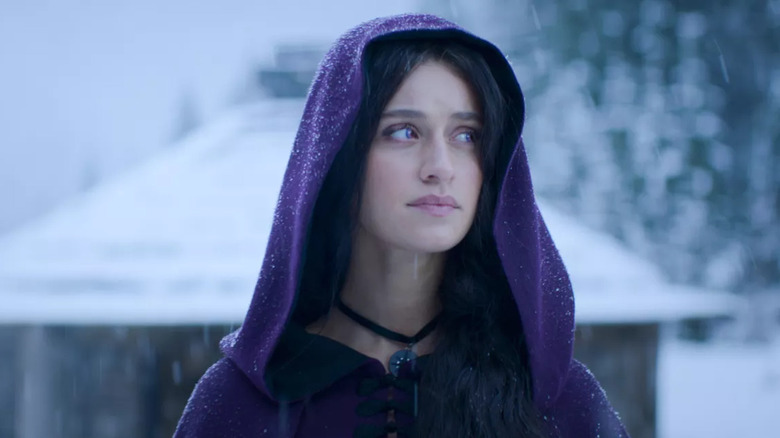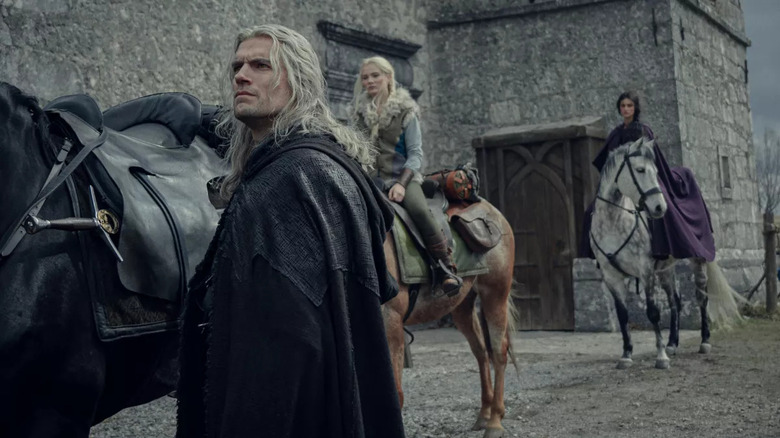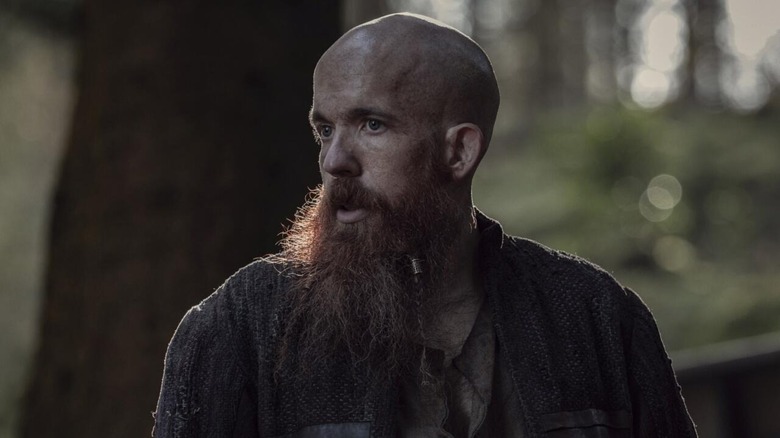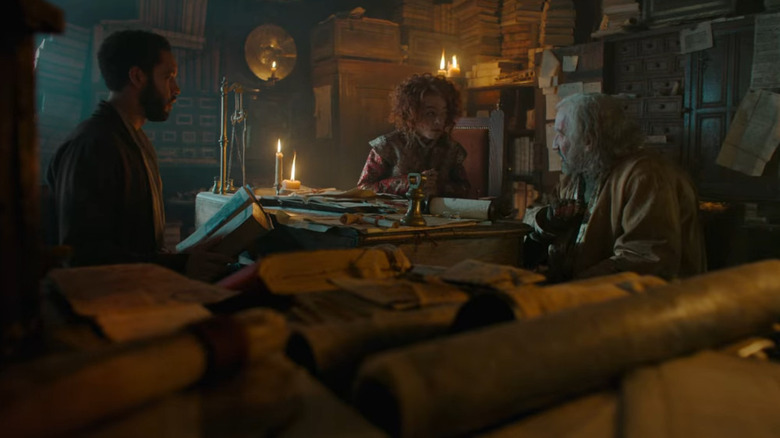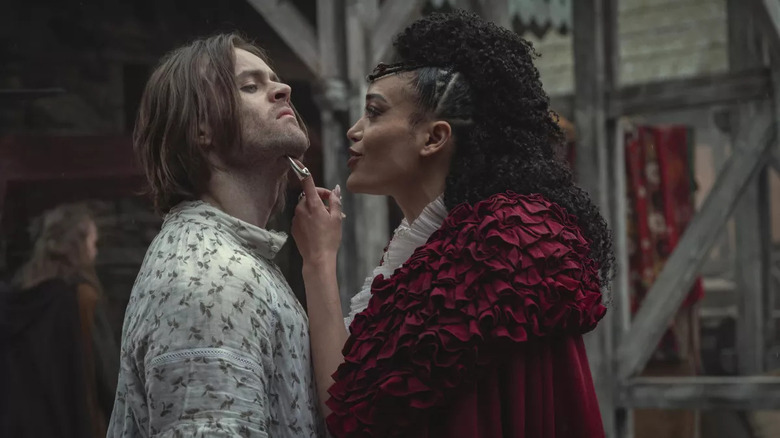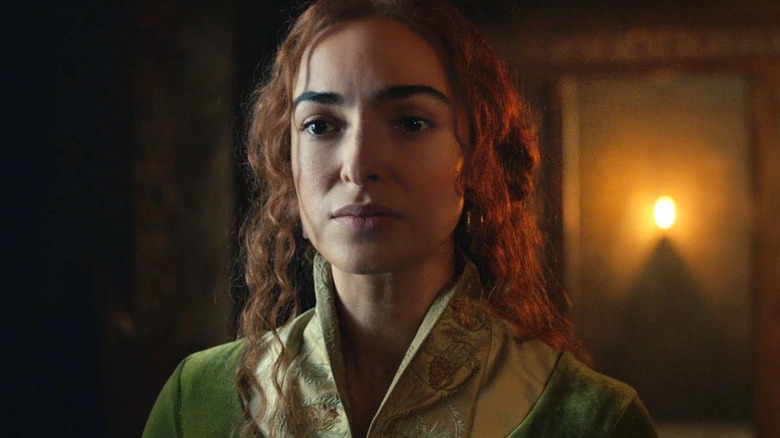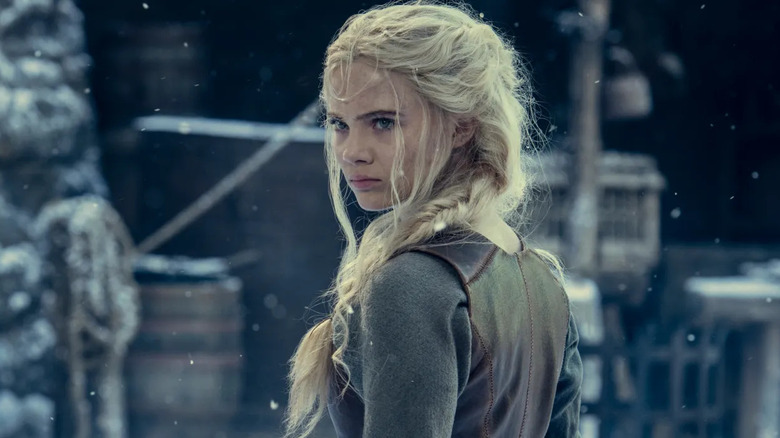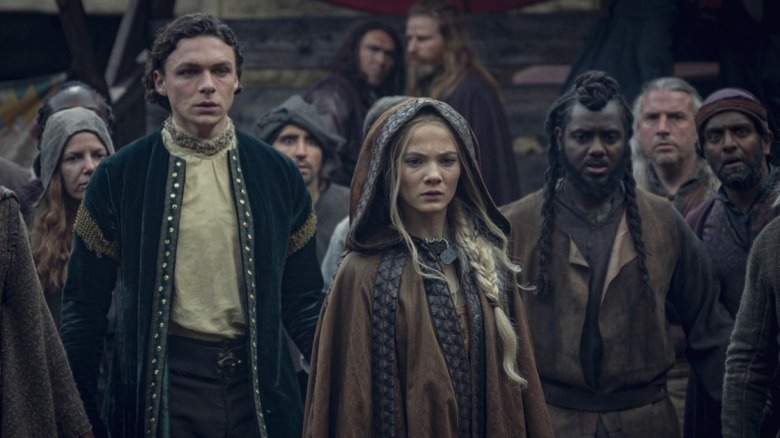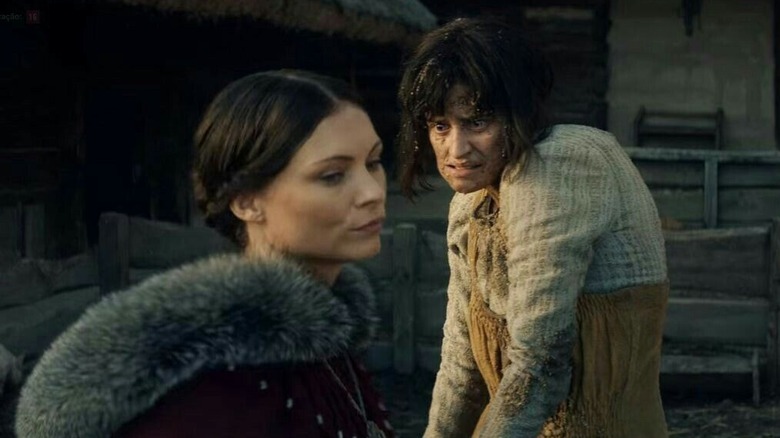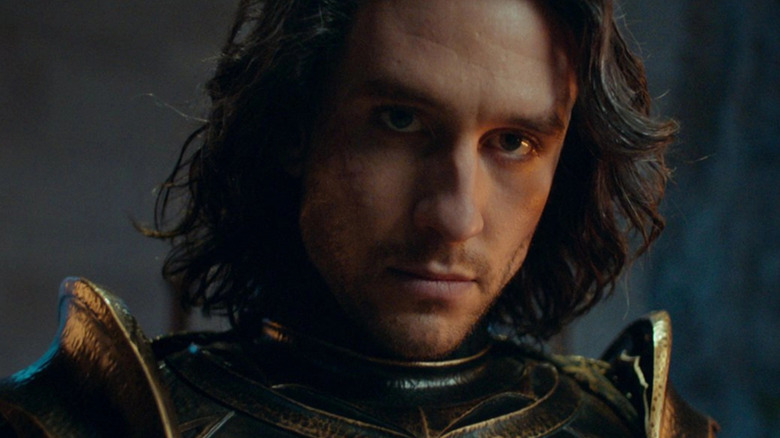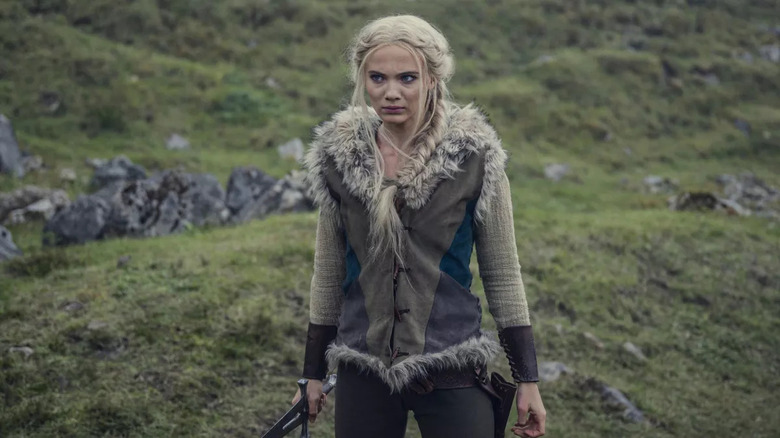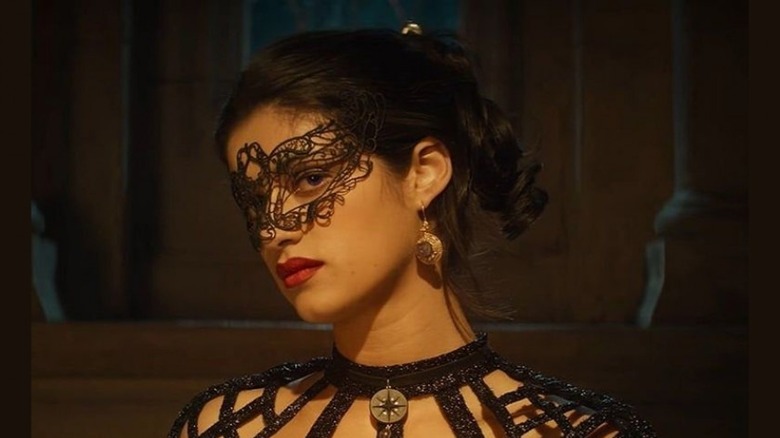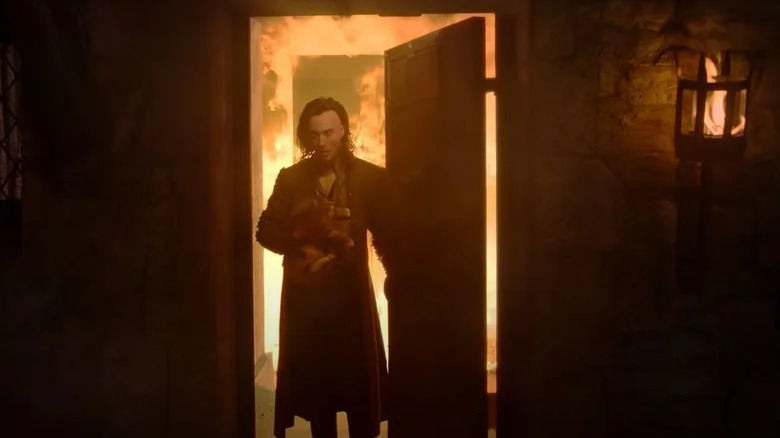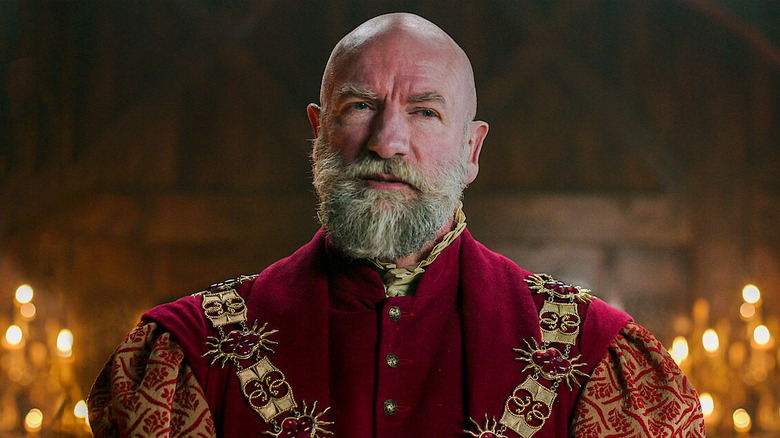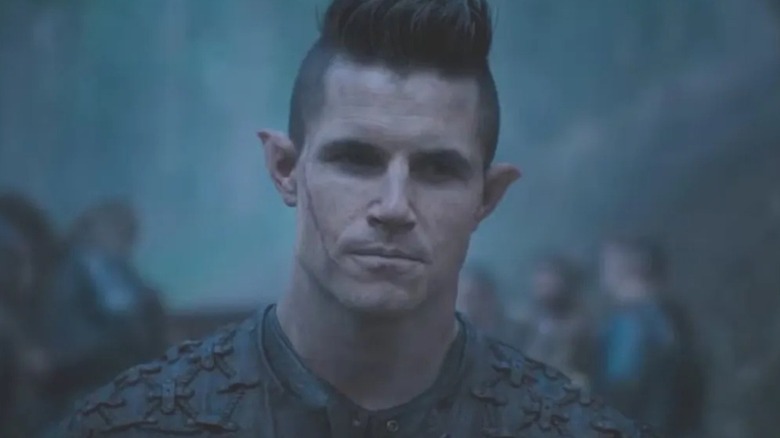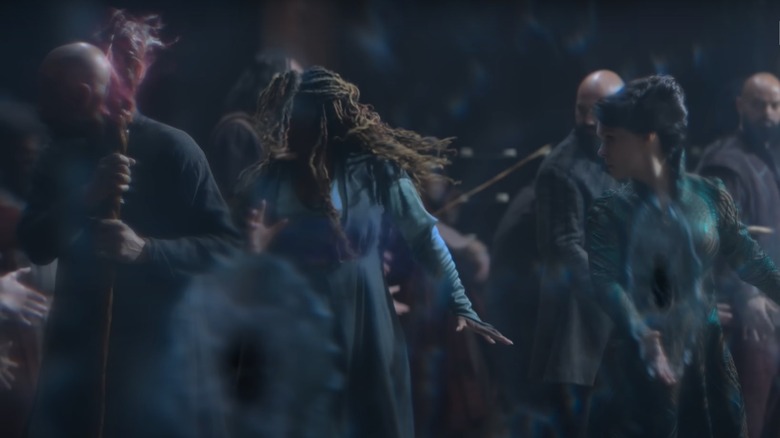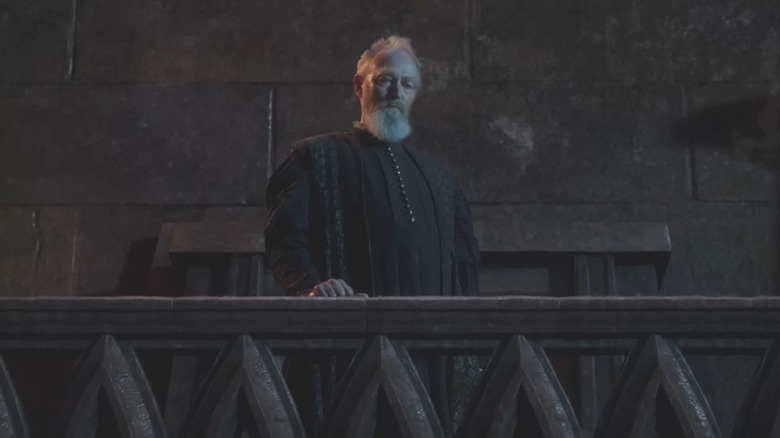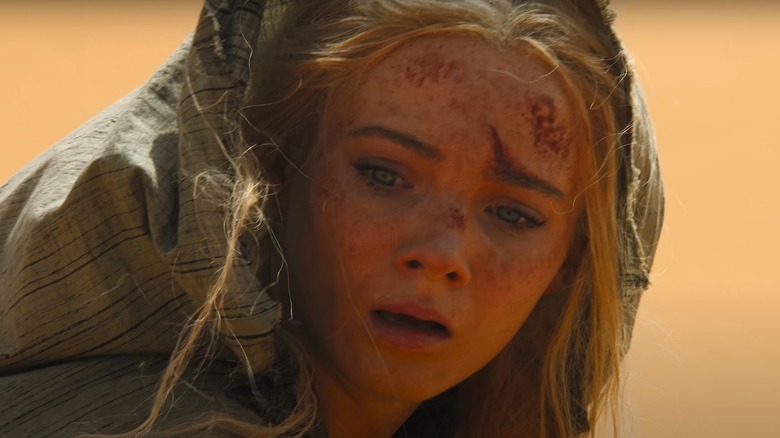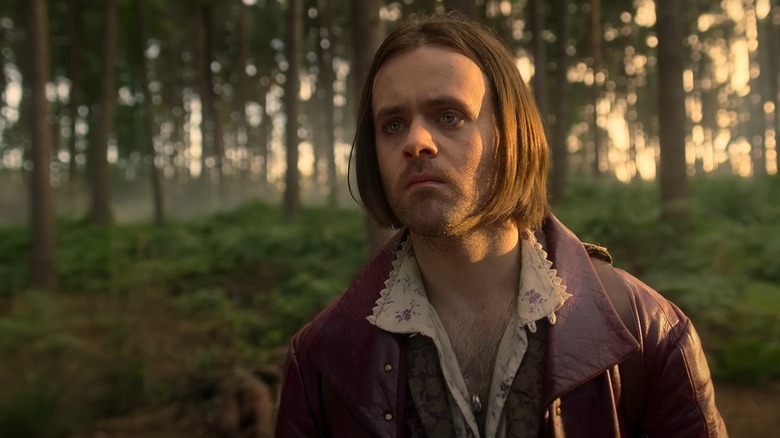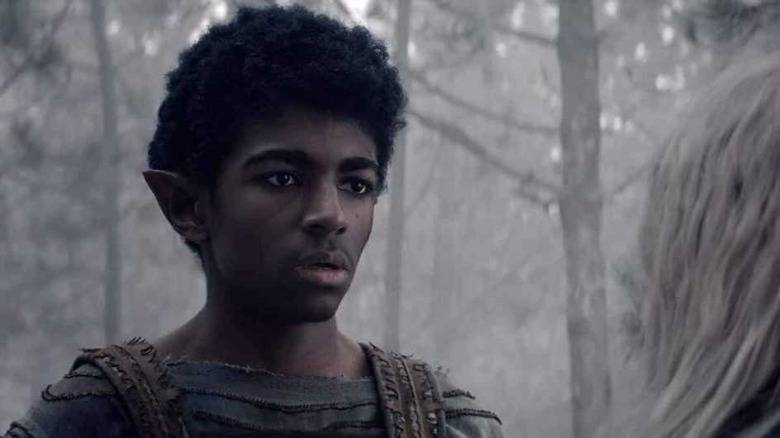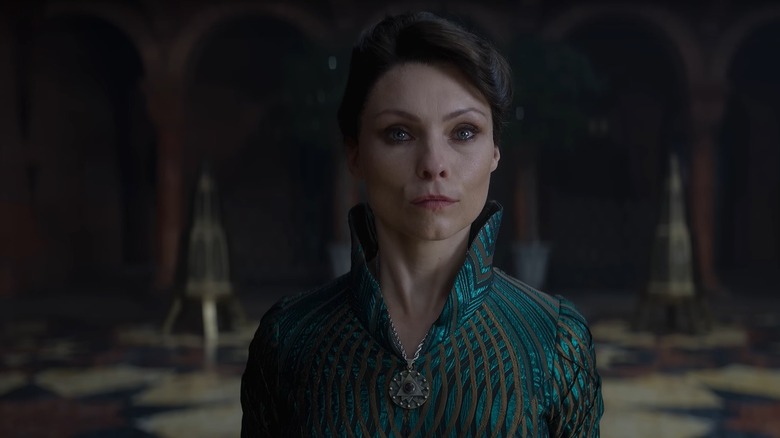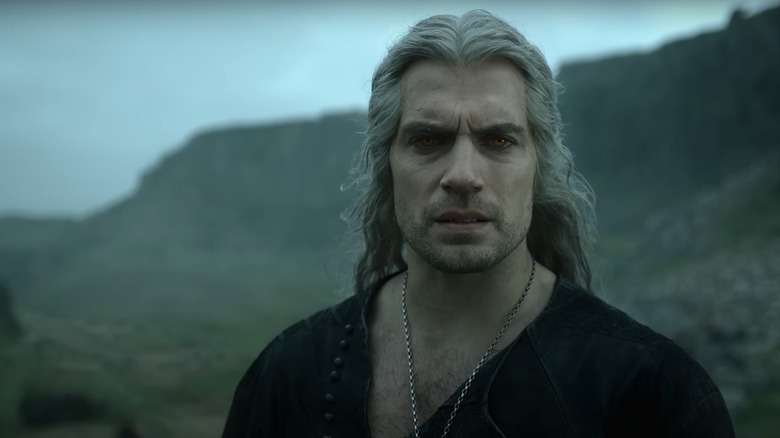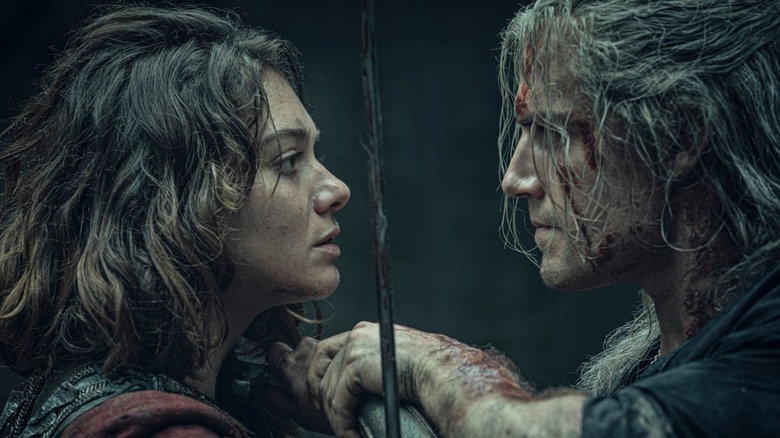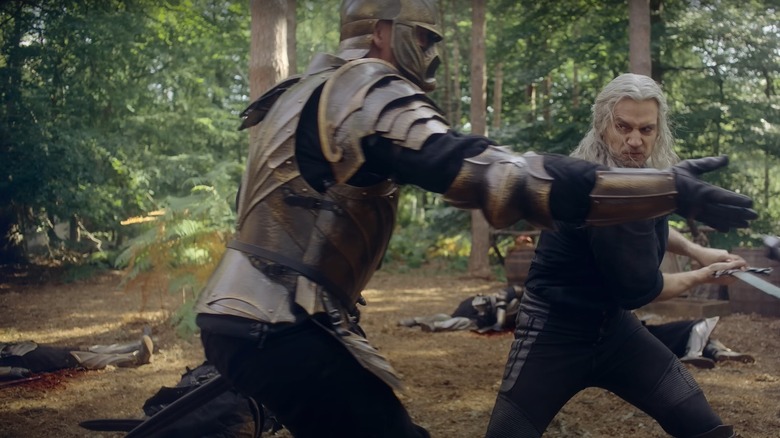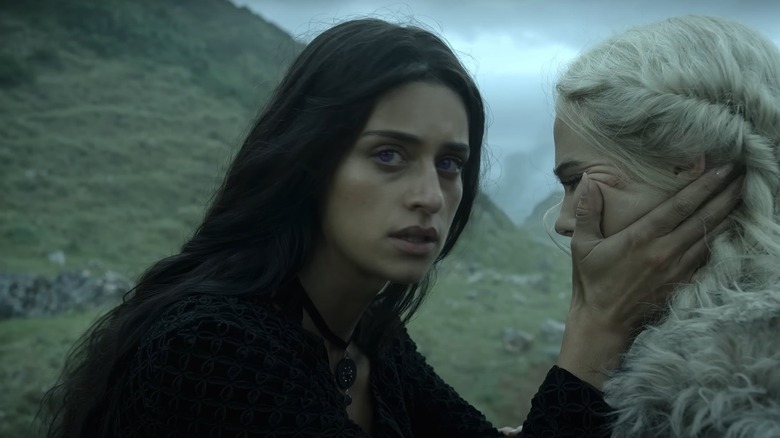Small Details You Missed In The Witcher Season 3
The third season of "The Witcher" has finally arrived, much to the delight of the show's many fans. While this will unfortunately be actor Henry Cavill's final season playing the role of the titular Witcher, Geralt of Rivia, with actor Liam Hemsworth set to replace him in Season 4, it looks like Cavill will definitely be going out in style as Season 3 is absolutely jam-packed with excellent storylines, action, and monsters.
Season 3 of "The Witcher" is adapted from Andrej Sapkowski's novel "Time of Contempt," a direct sequel to "Blood of Elves," the novel that the show's second season was based on. Once again following the adventures of Geralt of Rivia, Season 3 sees the famous Witcher take a more active stance in his attempts to protect his ward, Ciri. Rather than remaining on the run, Geralt works with Yennefer and the mages of Aretuza to uncover the secret plots to kidnap the Princess of Cintra and root out her deadly attackers.
Much like "The Witcher's" previous seasons, Season 3 features a multitude of plotlines covering many different points of view, with many of those characters involved in complicated schemes and nuanced political agendas. As such, it would be easy to gloss over some of the show's many minor details with only one viewing, so here are some of the small details you may have missed in "The Witcher" Season 3.
Dear Friend
Season 3 of "The Witcher" opens with a montage that catches viewers up on what the series' central trio, consisting of Geralt, Ciri, and Yennefer, have been up to since leaving Kaer Morhen at the end of Season 2. As time passes, Geralt and Yennefer are shown to be working together to help keep Ciri hidden and help her learn to control her magic. Unfortunately, Geralt still hasn't forgiven Yennefer for nearly giving her up to the Deathless Mother at the end of Season 2 and refuses to communicate with her directly. As such, the audience is treated to Yennefer's voiceover as she narrates the letters she writes to her former lover.
Each letter begins with the phrase "Dear Friend." At first, this might not seem like an unusual way to start a letter, but Yennefer's sarcastic delivery of the line in each voiceover suggests there might be more to this phrasing than meets the eye. In fact, the term "Dear Friend" is a direct callback to the Season 2 episode, "Dear Friend." In the episode, Geralt and Yennefer are finally reunited for the first time since Yennefer's alleged death. When he introduces her to Ciri, her refers to her as his "dear friend." Yennefer is surprised by the term, offended that given their long history as lovers, Geralt only refers to her as a friend, even a dear one.
Rule of Three
Jaskier is first reintroduced in "The Witcher" Season 3's first episode, as he is being thrown out by a woman he cheated on. As he is tossed out on the streets, he is approached by Redanian mage Philippa Eilhart and the Redanian prince, Radovid. After the two leave him, he is then approached by the dwarf Yarpen, who was sent by Geralt of Rivia to enlist his help. Yarpen seems annoyed that he has to deal with Jaskier again, and the two exchange quips until Jaskier makes a mention of the Rule of Threes and that is what must be done. This is not only a cheeky nod to the fact that Jaskier is a writer, but also a reference to the fact that this is the third time that the two would be working together.
The first time that Geralt and Jaskier team up with Yarpen is in the Season 1 episode "Rare Species," where he and his band of dwarven warriors were among the four teams that set out to hunt the green dragon for King Niedamir. While he and his team begin as rivals to Geralt and Jaskier, they ultimately team up, and Yarpen befriends Geralt. In the Season 2 episode "Voleth Meir," Geralt and Jaskier enlist the aide of Yarpen's crew after Ciri is kidnapped by Yennefer. Yarpen accompanies the two until Ciri is safely back in Geralt's custody.
Istredd's inquiries
In the second episode of Season 3, titled "Unbound," Geralt and Jaskier visit the detective agency Codringher and Fenn in order to purchase information on Rience, a fire-wielding mage who has been hunting Ciri relentlessly, to try and determine who he might be working for. After disarming the trap, Geralt meets with Ellis Codringher, who attempts to strongarm the Witcher into paying more money for the information. Instead, Geralt makes a bet with the detectives –one he ends up winning.
During Geralt's conversation with the duo, Codringher mentions a visit from Istredd, referring back to a scene from the show's second season episode, "Dear Friend." After teaming up with Geralt and learning that Ciri was able to destroy a monolith, Istredd visits the detective agency in hopes of learning more about the situation. He discovered that a certain gene, called Leishardrathardlara, kept appearing in the women of the Cintran royal bloodline and that it may be the key to how she was able to destroy the monolith.
Jaskier's floral shirt
Jaskier is one of the most prominent characters in "The Witcher," playing a major role in the show's third season. A bard that befriends Geralt while following him in his adventures to gain inspiration for his songs, Jaskier has quickly become a fan-favorite character thanks in no small part to actor Joey Batey's wonderful performance. Not only does the character have great chemistry with Geralt and adds a unique and comedic dynamic to the cast, but he also sings several original songs with deep ties to his relationship with Geralt, which have proven very popular among much of "The Witcher" fanbase with their catchy tunes.
In Season 3, Jaskier has an even bigger role than in the previous seasons, following Geralt and company on many of their adventures, striking up an interesting relationship with Radovid, the Prince of Redania. Throughout the season, Jaskier wears a shirt with a floral print, no doubt a reference to the character's name. In the English translations of Sapkowski's novels, Jaskier goes by the name Dandelion. However, Netflix chose to keep the character's Polish name, which translates more closely to buttercup, a small yellow flower.
Zeilil eip
"Unbound," the second episode of Season 3 of "The Witcher," reintroduces audiences to Triss Merigold, one of Yennefer's fellow sorceresses, as well as a former mentor of Ciri. It is revealed that Triss hasn't yet returned to King Foltest's court in Temaria, despite some members of the Brotherhood urging her to do so, but has instead remained at Aretuza. Tissaia has continued to protect her, and given her a role at the school as a teacher. In the episode, she is briefly seen teaching a lesson to a group of students.
Eagle-eyed viewers might notice some familiar aspects of this particular lesson. Each student has a branch of daisy flowers and a rock in front of them. This indicates that they are likely the levitation incantation, in which the life force of the flowers is drained in order to lift the rock. The incantation spoken in order to lift the rock is "Zeilil eip," which in Elder Speech translates to "rise up." This is one of the first lessons Yennefer learned in Season 1 of "The Witcher," and remains one of the most important in her mind. After losing her ability to use magic in Season 2, Yennefer attempted to recite "Zeilil eip" while in the Deathless Mother's lair.
Aplegatt's close call
After parting ways with Geralt at the end of Episode 1, Ciri and Yennefer attempt to lay low as they slowly make their way to Aretuza, where Yennefer hopes that her old mentor Tissaia will help train Ciri to control her magic. While stopped at a local outdoor tavern, Ciri bumps into a courier that wishes her safe travels. However, unbeknownst to the courier, Ciri sees a vision of his impending death. As he rides his horse through a forest at night, an arrow from an unknown archer flies into his neck, swiftly killing him and knocking him off of his horse.
The courier's name is never mentioned in the show, but book readers will know the character to be Aplegatt, a royal messenger for Demavand, the King of Aedirn. He was sent on a mission to bring back correspondence from Sigismund Dijkstra of Redania. His death, while seemingly a small and unimportant moment, creates major ripples throughout the Northern Kingdoms, due to a letter he was unable to deliver. While Aplegatt isn't actually killed until much later in the season, Episode 2 provides a small hint of what is to come when the courier visits Redania and attends King Vizimir's party. The king fires an arrow in jest, and the arrow whizzes past Aplegatt's face, nearly killing him as it hits the wall just in front of him.
The legend of the eels
In Episode 3, titled "Reunion," Yennefer and Ciri make another stop on their way to Aretuza, this time in the town of Gors Velen. Yennefer has plans to reach her mentor Tissaia but needs to split up with Ciri in order to do so. As such, she brings Ciri to the Giancardi Bank, which is run by a local dwarf named Molnar. Molnar is indebted to Yennefer after she had saved his family in the past, and agrees to watch after Ciri. He places her in the care of his assistant, Fabio Sachs, who he tasks with protecting while she explores the city.
While exploring the streets of Gors Velen, Ciri happens upon a painting of the tower at Aretuza. Fabio tells her about the painting, while also telling her stories about a famed academy for mages. In particular, he tells that he heard a tale that some students get turned into eels. Although this may be a mere legend to Fabio, audiences will know that his story is indeed true, as it was confirmed in the Season 1 episode "Four Marks," where Yennefer sees Tissaia turn three of her fellow students that were underperforming into eels to help power Aretuza's magic.
Don't look at her, look at me
Despite all the chaos caused by Ciri in Gors Velen, Yennefer's trip proves fruitful, as she is able to contact Tissaia and arrange to have Ciri brought to Aretuza to study magic. When Ciri is brought before Tissaia, an interesting interaction happens between the two characters. Ciri, clearly intimidated by Yennefer's longtime mentor, looks at Yennefer with a pleading stare while Tissaia grabs her face and examines her.
This scene calls back to Yennefer's first meeting with Tissaia years before. While there are parallels between the two women's journeys — both wield powerful magic but are untrained — there may be an even deeper meaning behind the intentional mirroring of the scenes. When Yennefer is first taken by Tissaia, she looks to her mother for help. Ciri looks to Yennefer, indicating that she may be beginning to see Yennefer as a surrogate mother. Later, it is confirmed that Yennefer has begun to see Ciri as a daughter, after Tissaia comments that Yennefer has finally found herself a child after many years of trying.
How to know a good leader
In the show's three seasons, many of the main characters on "The Witcher" have grown and evolved quite a bit since the first season. However, it can be argued that few have come nearly as far as Cahir, a high-ranking Nilfgaardian intelligence officer and one of Emperor Emhyr's most trusted allies. In Season 1, he was charged with capturing Princess Cirilla of Cintra and bringing her back to Emhyr. Throughout the season, Cahir appears to be a true believer in the Nilfgaardian cause, never questioning his loyalty to Emhyr or his belief in Nilfgaard's mission, despite all of the brutality he has witnessed, and been a part of, in Emhyr's name.
However, things begin to change after Cahir is captured in Season 2. While escaping the Brotherhood's custody and smuggling himself back to the Nilfgaardian-held Cintra, Cahir spends a lot of time hiding among different peoples, especially the elves. Upon returning, he appears softer and more lenient towards those who are not in line with all of Nilfgaard's beliefs, including the mage Fringilla.
In Season 3, Emhyr asks Cahir to murder Gallatin, an elven warrior he befriended. He carries out the deed, but it becomes apparent that the decision weighs heavily on him. When meeting with Emyhr, Cahir asks, "You said you knew a good leader when you saw them. How?" This might indicate that Cahir's loyalty to Emhyr as a leader might finally be waning.
Ciri sees herself as a Witcher
In the season's fourth episode, titled "The Invitation," Geralt and Ciri must take a ferry to make their way to Aretuza to attend a gala put on by Tissaia and the Brotherhood. When they arrive, Jaskier informs them that the ferryman refuses to leave because he is afraid of an unknown monster lurking in the waters. It's at this time that Ciri says "We're Witchers, aren't we?" in order to convince Geralt to help the ferryman by getting rid of the monster.
This scene is more significant than it may seem at first. While viewers have seen Ciri spend a considerable amount of time throughout Seasons 2 and 3 learning how to fight and training to be more like the Witchers she lived with at Kaer Mohren, this marks the first time that she has actually referred to herself as a Witcher. Although she never underwent the mutation process to possess a Witcher's powers, she nevertheless considers herself to be one of them. This is in stark contrast to the mages, where Ciri shows little interest in aligning herself with them, despite Yennefer's pleas to do so.
All is not as it seems
Season 3, Episode 5 of "The Witcher," titled "The Art of Illusion," is interesting in that it pretty much all takes place during the course of one night, and is told out of time order from various perspectives. The center of the episode's plot is the gala being held at Aretuza by the Brotherhood, meant to help unite the Northern Kingdoms, and their magical advisors, against Nilfgaard. However, Geralt and Yennefer have an alternate agenda, hoping to use the event to find evidence that backs their theory that the Wizard Stregobor is behind Rience's attacks on Ciri.
Throughout the episodes, a song sung by a group of bards is played multiple times as viewers experience the story's different perspectives. If viewers listen closely to the lyrics, they might notice that the bards regularly repeat the phrase "All is not as it seems." This is a not-so-subtle allusion to not only the theme of the entire episode, but also the twist ending. Stregobor had nothing to do with Rience's attacks. Instead, Vilgefortz, a trusted ally of Tissaia, is the mastermind behind the evil plot.
Rience recast
Rience is one of the most terrifying villains in "The Witcher." In Season 2, he was rescued from the dungeons below Cintra by a mysterious woman named Lydia, who hired him to work for an unknown employer. Unfortunately for Geralt, this employer has set Rience's sights on Ciri, and his relentless hunt for her has sent Geralt and his allies into hiding. Part of Rience's sadistic nature is due to his extended use of the forbidden fire magic. In Season 2, he tells Jaskier that each time he uses fire, it consumes part of his soul.
Viewers might notice that Rience is looking a bit different this season. That's because Rience has been recast. Chris Fulton, the actor playing Rience in Season 2, did not return to portray the character in Season 3. Instead, actor Sam Woolf, who has also portrayed Prince Edward in "The Crown," has taken over the part. In addition to a change in casting, Rience's facial prosthetic has also seen a pretty dramatic alteration. While Rience's burns only covered the top half of the left side of his face in Season 2, the prosthetic scarring now covers the entirety of the left side of his face, making his appearance even more distinct.
The useful queen
Vizimir II, King of Redania, is one of the major players in the War of the Northern Kingdoms in Season 3 of "The Witcher." Early in the season, Vizimir was making plans to capture Ciri in order to marry her and take control of Cintra, making him the strongest king in all of the Northern Kingdoms, a plan that was wholeheartedly supported by his spymaster, Sigismund Dijkstra, and his sorceress advisor, Philippa Eilhart. However, after meeting with Nilfgaard, Vizimir agreed to hand Ciri over to the invading kingdom, a move that Dijkstra and Eilhart could not abide by.
One of the season's most shocking moments occurs when Vizimir receives a box as a "gift" from Nilfgaard. The box contains the head of his wife, Hedwig, leaving Vizimir very distraught. His brother, Radovid, discovers that Dijkstra and Eilhart were responsible for her death, using it to blame Nilfgaard for the attack while also freeing the king to remarry Ciri if they were to capture her. While the moment comes as a big surprise, the scheming spymaster hints at the big move earlier, when he tells Phillips that the queen has a good head on her shoulders and that it might finally be time to "make her useful."
Squirrel tails
The world of "The Witcher" features many different groups, all with their own unique history, cultures and allegiances, so audiences could be forgiven for sometimes having difficulties in tracking them all. One of the groups that has risen to prominence in Season 3 is the Scoia'tael Army, a group of elven fighters led by the warrior Gallatin, played by series newcomer Robbie Amell. The Scoia'tael work alongside Francesca Findabair, the queen of the elves, though her obsession with capturing Ciri has Francesca at odds with Gallatin.
While this army of skilled warriors officially go by the name Scoia'tael, viewers might notice that they are often referred to as squirrels. The nickname might seem strange at first, but its meaning comes from "The Witcher" novels, particularly "Blood of Elves." In the novels, the Scoia'tael are a group of fighters consisting primarily of elves, with some dwarves and halflings, who aim to ensure freedom and safety in the Northern Kingdoms for all non-human races. The word Scoia'tael translates to "squirrel" in Elder Speech, a name they were given due to their tendency to wear squirrel tails on their hats.
Dimeritium-tipped arrows
The sixth episode of Season 3 is packed with shocking moments that are bound to leave fans gasping. One such moment takes place after Nilfgaardian troops manage to sneak themselves into Aretuza and begin attacking the mages who are there for the conclave. Luckily, the mages refuse to go down without a fight, with several of them, including Tissaia de Vries and Artorius Vigo, erecting a magical barrier to halt an onslaught of arrows being volleyed in their direction. Unfortunately, the move does nothing to slow the arrows, which pierce right through the magical wall and kill several mages, including Artorius.
Tissaia is quick to note that the arrows were tipped with dimeritium. In the universe of "The Witcher," dimeritium is a unique type of metal known to suppress magical abilities. Since the arrowheads are coated with dimeritium, they're able to pass through the magical barrier with ease, even though that same barrier can stop any other kind of material. This scene actually isn't even the first time dimeritium is used in Season 3 of "The Witcher": Earlier in the episode, handcuffs made of dimeritium are used to hold Vilgefortz and his followers captive by Redanian spymaster Sigismund Dijkstra. Gamers may also recognize the fictional metal from the video game "The Witcher 3," where the ore is a collectible crafting material used to make certain types of gear in the game.
Falka will be waiting for you
The wizard Stregobor wasn't exactly a sympathetic character throughout his three-season run on "The Witcher." After all, he was greedy, manipulative, and had a deep-seated hatred towards elves and any students with elven blood. However, in his final moments, he willingly sacrifices himself, using the all-consuming fire magic to help protect the mages of Aretuza by destroying a large force of elven and Nilgaardian invaders. His final words to the elven invaders, "Falka will be waiting for you," not only highlight the character's longstanding racism towards elves, but also hint at the important role that Falka will play in the show's final two episodes of the season.
Following the events of the battle, Ciri is transported to the Korath Desert on her own, but begins to see a hooded figure who both taunts her and gives her advice on surviving. Viewers of "The Witcher: Blood Origin" might immediately recognize the voice as that of Falka, a revolutionary with elven blood, known for her violent nature. Stregobor had actually fought during Falka's rebellion and ended up losing both of his hands, using illusions to make it appear as if he still had them. The line also ties back to Stregobor's history of obsessing over curses. Falka was famous for the curse she placed on those that killed her, so it makes sense that she would be a fixation of Stregobor, who also had a fixation on the famous curse of the black sun.
The Frying Pan
Season 3, Episode 7 of "The Witcher" is a unique episode in that it focuses almost entirely on Ciri, with only brief glimpses of the titular witcher himself, Geralt of Rivia. The episode picks up in the aftermath of the Battle of Thanedd, which ended in Ciri destroying Tor Lara, also known as the Tower of the Gull, and being sent through the portal inside. Unfortunately for Ciri, the unstable portal teleports her into the sky over an arid stretch of inhospitable desert. Ciri, having studied geography, notes that Mousesack used to refer to this place as The Frying Pan.
In the universe of "The Witcher," The Frying Pan is a nickname given to the Korath Desert, a large sea of arid sand dunes with few living inhabitants. The Korath Desert is far to the south of The Northern Kingdoms, where the majority of the story of "The Witcher" takes place. It also lies to the east of Nilfgaard, the kingdom under the rule of Ciri's father, Emhyr var Emreis. While Nilgaard has no control over the neighboring desert, it is still the closest geographically that Ciri has been to her father's kingdom in all three seasons.
Is there a unicorn nearby, by any chance?
It's no secret that Jaskier is a fan-favorite character, and his interactions with his fellow leads are among the funniest in the show. After spending time bonding with Geralt in Season 1 and Yennefer in Season 2, the third season of "The Witcher" finally gives Jaskier some valuable time with Ciri, building the relationship between the two. This leads to several comedic scenes, including one particular standout in the fourth episode. While Geralt and Yennefer speak alone, Ciri and Jaskier watch from the bushes nearby, and make up their own dialogue for the pair's conversation.
When Geralt and Yennefer finally kiss, Jaskier jokes, "Is there a unicorn nearby, by any chance?" At first, this quip appears to just be well in line with Jaskier's sense of humor, but it's actually the show's clever way of subtly foreshadowing an important character that Ciri meets later in the season. After being teleported to the Korath Desert, Ciri is alone and forced to survive with only what she has on her. Luckily, she happens across a nearby unicorn, whom she nicknames Little Horse. The two help each other survive, and she even rescues him from a sand monster. After Little Horse is poisoned, she heals him by tapping into fire magic. The unicorn becomes afraid of her, and runs away, leaving Ciri alone once again.
Elaine Ettariel
During his climactic fight with Vilgefortz during the coup at Thenadd, Geralt is grievously injured and near death. His back is broken by the traitorous mage, leaving him unable to walk without healing. Luckily, Geralt is brought to Brokilon Forest, the home of the dryads, which viewers may remember from the show's first season. While Geralt is brought inside as a friend to the dryads, access to the forest is forbidden to most outsiders. This becomes an issue when Jaskier comes to the forest, hoping to see Geralt. He's denied entry, but the tricky bard has an idea that will help the dryads see that he is a friend. He begins to sing a beautiful song in elder speech that the dryads call "Enchanted Flowers."
Readers of "The Witcher" books might recognize this song by another name, "Elaine Ettariel," an elven ballad that appears in "Time of Contempt," the novel that is the basis for Season 3. The ballad tells the story of an elven heroine named Ettariel, who gives the writer of the song a beautiful and enchanted flower after they fall deeply in love with her. In the book, "Elaine Ettariel" translates to "Ettariel the Beautiful," rather than "Enchanted Flowers." Players of the first "Witcher" video game may also recognize the song, as a remixed version of it is played during Chapter IV of the game's story.
Dara returns to Brokilon Forest
Geralt of Rivia may be the only familiar face that Jaskier sees after entering Brokilon Forest, but viewers will quickly see that another recognizable character has made their way into the home of the dryads. That character is Ciri's elven friend Dara. After splitting up with Ciri in Season 1, Dara became a spy for Sigismund Dijkstra and Phillipa Eilhart, joining Francesca's elves to gain information, before eventually joining them for real in order to support the cause. However, after witnessing the violence at Aretuza, Dara makes his way to Brokilon forest with several other refugees, ultimately deciding to stay with the dryads and avoid future violence.
However, this isn't the first time that Dara has been to Brokilon Forest. In Season 1, he and Ciri find their way to Brokilon while on the run from Nilfgaard. After being shot by one of the dryads, Dara is healed and made to drink the waters of Brokilon, which will kill anyone with evil intents towards the forest. For those pure of heart, drinking the waters will help them numb their pain and eventually forget their troubles. Dara is happy in Brokilon and wishes to stay, but after Ciri is forced to leave, he follows her out of Brokilon. However, it makes sense that he would eventually return, as his time in Brokilon Forest is the happiest viewers ever see him.
Tissaia's Piglet
One of "The Witcher" Season 3's saddest moments comes near the end of Episode 8. Tissaia de Vries, unable to cope with the loss of Aretuza — and blaming herself for trusting Vilgefortz and failing to protect her fellow mages — sadly chooses to take her own life. Not only is Tissaia one of the most important characters to die so far on "The Witcher," but her death has a major impact of Yennefer of Vengerberg, who views her teacher and mentor like a mother. Losing Tissaia is a major blow to the remaining sorceresses, but also helps to unite them in a common cause.
The scene is not only poignant in its storytelling, providing a tragic end to an arc that almost saw Tissaia at her happiest, but it also fittingly includes several callbacks to the beginning of her relationship with Yennefer, whom she addresses in her final letter too. In the letter, she refers to Yennefer as Piglet, a nickname that she used for the young sorceress back when she was a student at Aretuza, and has rarely used since. She also writes, "Sometimes the best thing a flower can do for us is die," a lesson that she taught Yennefer during her training at the school. Finally, she takes her own life by slashing her wrists, the same fate she saved Yennefer from when the latter tried to take her own life at a young age.
If you or someone you know is struggling or in crisis, help is available. Call or text 988 or chat 988lifeline.org
'Tell me this isn't the last time I'll see you'
It takes some time for Yennefer of Vengerberg to visit Geralt in Brokilon Forest after the injuries he receives while fighting Vilgefortz. However, once she does arrive, their scene together is very sweet. She apologizes for not visiting him earlier, and brings the bad news that she wasn't able to recover Ciri. Geralt acknowledges that Yennefer must leave to help the remaining sorceresses, and that it is his job to recover Ciri. At the end of their conversation, Yennefer says to Geralt, "Tell me this isn't the last time I'll see you." This phrase has been used in the show before, but there is a haunting finality to her delivery in this scene.
This is likely due more to the behind-the-scenes issues than the actual story. With several seasons to go, Geralt and Yennefer will undoubtedly see each again, but this scene does end up being the last time that actress Anya Chalotra and actor Henry Cavill share the screen. When they next meet, Geralt will be played by actor Liam Hemsworth, who is taking up the mantle of Geralt of Rivia following Henry Cavill's departure at the end of the season.
Geralt finally lets Renfri go
Henry Cavill's final scene in "The Witcher" is certainly a memorable one. As he and Jaskier look to sneak past a Nilfgaardian checkpoint, Geralt offers an expensive pendant as a bribe to a guard. Jaskier tells him not to give it up, knowing how much it means to him, but Geralt lets it go anyway. The Nilfgaardian soldier lets them through, but Geralt turns back after seeing a group of elves in trouble. He slays all of the soldiers but one. While he no longer needs the bribe to get past the checkpoint, he still chooses to leave the pendant behind.
This scene is symbolic of Geralt finally letting the past go and choosing to move forward. The pendant belonged to Renfri, a princess that Geralt fell in love with in the series' first episode. While he eventually had to kill Renfri to save the town, he never forgave himself for her death. He held on to her pendant as a reminder of his feelings for the princess, as well as his own perceived failure to save her. Giving up the pendant and willfully leaving it behind shows that Geralt has finally moved on. It's a perfect link from Henry Cavill's first episode to his last, and may be a nod to Geralt entering a new chapter of his life, where he will be played by another actor.
The Ride of the Witcher
Netflix wisely ended Season 3 of "The Witcher" on a high note, with not only an incredibly choreographed fight scene, but poignant storytelling that helped viewers say goodbye to Henry Cavill's interpretation of the hero. To top things off, the credits sequence introduced a new original song called "The Ride of the Witcher." The song is an in-universe ballad that Jaskier had been working on during Geralt's recovery in Brokilon Forest. While Jaskier actor Joey Batey has sung the majority of the series' original songs, this time he shares the song with the band Percival.
Percival, also known as Percival Schuttenbach, is a folk metal band from Poland, and their inclusion in the series is rather fitting. Not only do they hail from the same country as Andrzej Sapkowski, the author of "The Witcher" novels, but they also have a long history with the franchise. The band itself is named after a character that appears in "The Witcher" novels, a gnome named Percival Shuttenbach who first appears in the novel "Baptism of Fire," which will likely serve as the basis for the series' fourth season. In addition, their song "Lazare" appears in the third game in "The Witcher" video game series, "The Witcher 3: Wild Hunt."
Never lost, always found
The phrase "never lost, always found," is one that viewers will hear quite a few times throughout Season 3 of "The Witcher." It's so prevalent that "The Witcher" Season 3, Vol. 2 trailer used it as its description on YouTube. The in-universe explanation has to do with Ciri's talisman, which Yennefer uses to place a locator spell that Ciri can deploy to help Geralt find her. Whenever she is lost, she utters the phrase, and they are drawn to her. However, the phrase is much more than just a sentence Ciri utters to activate the locator spell: it's more or less the theme of the entire season, and in some ways, the entire series.
While Ciri spent pretty much the entirety of Season 2 by Geralt's side, Season 3 splits the two up far more often. Ciri is regularly separated from Geralt and Yennefer and often has to use the locator spell to bring them back together. She also mentions to Yennefer that the only thing she really cares about is that the three of them stick together. By the time the season wraps, Ciri has once again been separated from her found family, and is now posing as a woman named Falka. But Geralt assures Jaskier that he will find Ciri at any cost, showing the audience that the theme of "never lost, always found" isn't going anywhere in future seasons.
